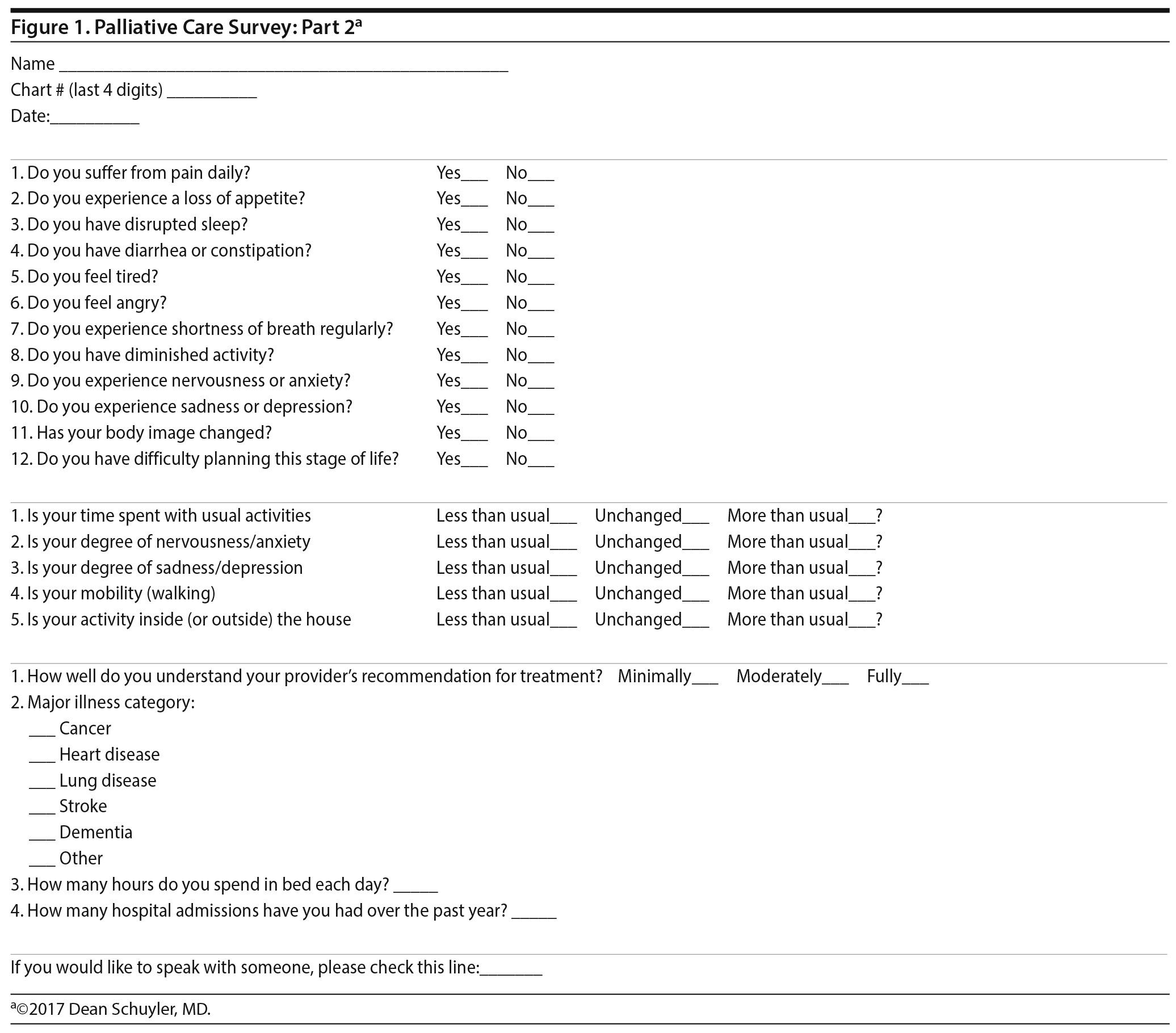Because this piece does not have an abstract, we have provided for your benefit the first 3 sentences of the full text.
There is continuing discussion that adapting to a serious medical condition would be aided by meeting with a mental health professional. A survey of outpatients with a major medical illness seen in a medical clinic has led to a second survey. The second survey incorporated many of the elements of the first one and added to them.

When to Refer to Palliative Care:
Part Two

EDITOR’ S NOTE
Through this column, we hope that practitioners in general medical settings will gain a more complete knowledge of the many patients who are likely to benefit from brief psychotherapeutic interventions. A close working relationship between primary care and psychiatry can serve to enhance patient outcome.
Dr Schuyler is a psychiatrist and a member of the palliative care team at the Ralph H. Johnson Veterans Administration Medical Center, Charleston, South Carolina. Dr Alsfeld is chief medical resident at the Medical University of South Carolina.
Prim Care Companion CNS Disord 2017;19(2):17f02126
https://doi.org/10.4088/PCC.17f02126
© Copyright 2017 Physicians Postgraduate Press, Inc.
Published online: April 20, 2017.
Corresponding author: Dean Schuyler, MD, Geriatrics/Extended Care, Ralph H. Johnson Veterans Administration Medical Center, Charleston, SC 29401 ([email protected]).
Funding/support: None.
Potential conflicts of interest: None.
There is continuing discussion that adapting to a serious medical condition would be aided by meeting with a mental health professional. A survey1 of outpatients with a major medical illness seen in a medical clinic has led to a second survey. The second survey incorporated many of the elements of the first one and added to them. Rinah Shopnik, DO, who runs the oncology clinic at the Ralph H. Johnson Veterans Administration Medical Center in Charleston, South Carolina, was concerned that we were missing something while caring for our outpatients. That "something" is an emotional element that might be remedied by allowing patients the opportunity to talk with a knowledgeable mental health professional.
The second survey (Figure 1), which was created by Dr Alsfeld, was given to 151 outpatients at our hospital. A point was assigned for each positive response. Seventy-three respondents met at least 1 of the following criteria: a mean survey score > 16 points (of 22 questions), > 12 hours a day spent in bed, ≥ 4 hospitalizations in the past year, and anyone who checked, "If you would like to speak with someone, please check this line." The survey identified 73 outpatients appropriate for a professional to speak with. Each of these outpatients was then called by a member of the hospital staff and asked if they would like to speak with a mental health professional about adjusting to their medical condition. Of the 73 patients identified, 28 responded that they would like to speak with someone.
Each of the 28 outpatients was called by Dr Schuyler. An attempt was made to set these meetings in tandem with other medical appointments that the patient already had established at the hospital. Sixteen evaluative appointments were set up. When appointments were not possible, a lengthy telephone call was done. The remainder of the patients would be called closer to a planned visit to the hospital or were not available when called. Once all of the patients who asked to be seen have been evaluated, a future survey will assess whether the visit with a psychiatrist to discuss adjustment to their illness was helpful.
REFERENCES
1. Schuyler D. When to refer to palliative care. Prim Care Companion CNS Disord. 2016;18(6):e1-e2. PubMed doi:10.4088/PCC.16f02074
Enjoy this premium PDF as part of your membership benefits!



